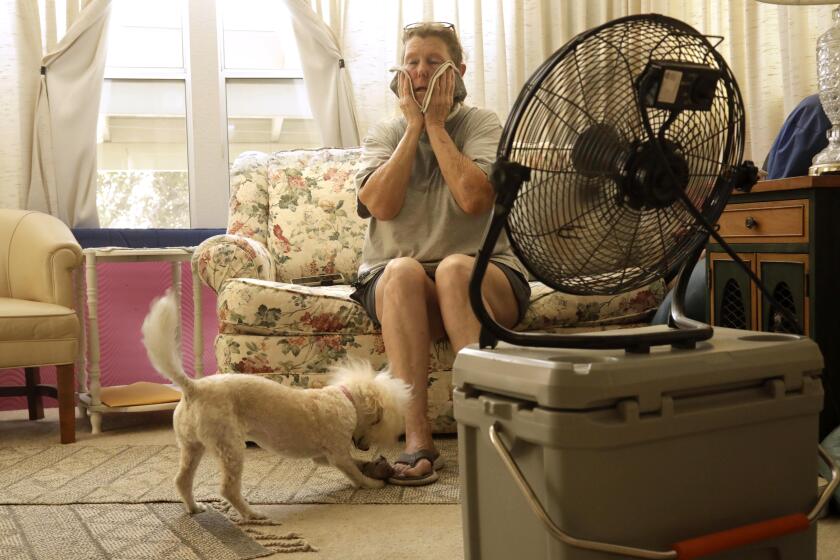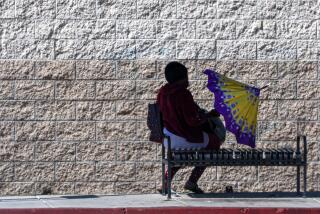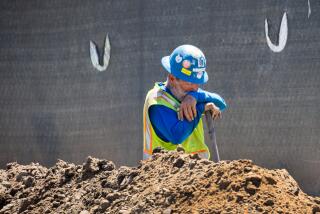Dangerous, triple-digit heat wave set to sizzle California

- Share via
A triple-digit heat wave is set to sizzle California through the week’s end, with near-record temperatures expected throughout the state.
The National Weather Service is warning of dangerously hot conditions, including temperatures as high as 106 degrees in Sacramento on Friday and 117 degrees in Borrego Springs on Saturday.
In the Los Angeles area, the Antelope Valley could soar to 105 degrees by Saturday, a potential record. Multiple excessive heat warnings and heat advisories have been issued in the state.
“We’ve had some prior heat waves this year, but not as intense as this one or as long duration,” weather service meteorologist Alex Tardy said in a briefing about the excessive heat.
The heat wave could also worsen air quality and elevate the risk of a wildfire spreading should a blaze ignite, officials said.
The South Coast Air Quality Management District has issued a heat wave ozone advisory for Los Angeles, Orange, Riverside and San Bernardino counties through Sunday, where high smog levels are expected as temperatures rise.
“Elevated temperatures, which enhance ozone formation rates and increase emissions of chemicals leading to ozone formation, coupled with predicted light winds may cause unusually high and persistent levels of ozone pollution,” the agency said.
Smog levels are likely to lead to unhealthy air conditions in parts of the South Coast Air Basin and Coachella Valley, they said.
In Los Angeles, temperatures will be far higher in inland areas than on the coast, according to David Sweet, a meteorologist with the weather service in Oxnard.
“There’s a really, really big difference between the temperatures on the coast, which will be just a few degrees above normal, and the temperatures over the Antelope Valley, which will be up near records,” he said.
Temperatures in Palmdale and Lancaster on Friday could surpass their previous records for the date, 103 degrees for both, set in 1985, Sweet said.
California chronically undercounts the death toll from extreme heat, which disproportionately harms the poor, the elderly and others who are vulnerable.
Extreme heat is one of the deadliest consequences of climate change, experts have said, and heat waves are increasing in frequency and duration. A Times investigation last year found that heat deaths are chronically undercounted in California, and could be as much as six times higher than previously believed.
Last summer, a record-smashing heat wave in the Pacific Northwest at the end of June killed scores of people as well as an estimated 1 billion sea creatures along the coast.
Forecasters this week are advising residents to stay hydrated, seek shade and avoid strenuous activity outdoors. People should wear lightweight, loose-fitting clothing and never leave children or pets alone in a car.
“During hot and humid weather, your body’s ability to cool itself is challenged in ways you may not expect,” the weather service said.
Signs of heat exhaustion and heat stroke include dizziness, thirst, nausea and weakness.
Heat waves last June also helped kick off the year’s fire season, with the Sugar fire and Beckwourth Complex fire igniting not long after record temperatures baked vegetation across the state. The weather service is advising residents to use caution with sparks or flame.
Adam Roser, a meteorologist with the weather service in San Diego, also noted that nighttime temperatures will remain toasty during the heat wave, including overnight lows in the 80s in Coachella and Palm Springs.
“Overnight lows will be quite warm,” Roser said. “So there’s very little in the way of relief.”
More to Read
Sign up for Essential California
The most important California stories and recommendations in your inbox every morning.
You may occasionally receive promotional content from the Los Angeles Times.











